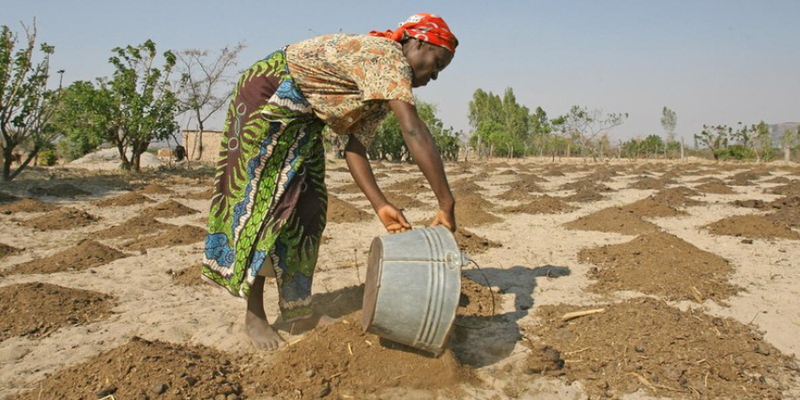ВНИМАНИЕ: Зимбабве будет осуществлять борьбу с вредными для растений организмами, модернизировав карантин
Posted on Вт, 03 Июн 2025, 13:17

Женщина-фермер в Зимбабве сеет семена © ФАО/Desmond Kwande
Зимбабве проводит модернизацию своих систем карантина, осуществляя строительство новых пограничных пунктов и создавая новые процедуры досмотра, поскольку в Африке недавно были обнаружены новые вредные для растений организмы, представляющие существенные риски для сельскохозяйственного сектора страны.
В частности, обнаружение в 2024 году возбудителя бактериального увядания и ожога листьев кукурузы в соседней Южной Африке вызвало беспокойство в Зимбабве, где в настоящее время ведется работа с партнерами по развитию и импортерами по вопросам содействия в обеспечении реагентами для использования в химических анализах импортируемых грузов растений и растительных продуктов, в отношении которых требуется пограничный досмотр.
Бактериальное увядание и ожог листьев кукурузы – это болезнь, возбудитель которой Clavibacter nebraskensis, в основном, поражает кукурузу и определенные травы, вызывая сильный ожог листьев, системную инфекцию и задержку роста, что, в конечном итоге, снижает урожайность. Ранее эта болезнь присутствовала только в Северной Америке и была одной из самых опасных болезней кукурузы на этом континенте.
Зимбабве рассказала о модернизации своей системы карантина на недавно проведенном заседании в Риме, на котором присутствовали должностные лица из одиннадцати стран Общего рынка Восточной и Южной Африки (КОМЕСА). Кроме того, Зимбабве представила подробную информацию о том, как будет поддерживать международное доверие к безопасности своего экспорта растений и растительной продукции.
Соответствующие страны подготовили планы после многомесячной работы по оценке фитосанитарного потенциала (ОФП), которая проводилась под руководством Секретариата Международной конвенции по карантину и защите растений (МККЗР) в целях определения недостатков в системах биозащиты.
Планы, представленные Зимбабве в Риме, были одними из наиболее перспективных. В рамках модернизации пограничного карантина Зимбабве планирует реконструировать и построить пункты для осуществления мероприятий после ввоза, как отметила специалист по научно-исследовательским разработкам Министерства земельных ресурсов, сельского хозяйства, рыболовства, водных ресурсов и развития сельских районов Луиза Макумбе (Louisa Makumbe).
«Строительство одного из таких пунктов ведется в Бейтбридже. Это ворота, через которые товары поступают из Южной Африки», – рассказала Макумбе в ходе недавнего заседания по гармонизации политики в области охраны здоровья растений в Африке, которое прошло в Риме, где расположена Продовольственная и сельскохозяйственная организация Объединенных Наций (ФАО).
Она сказала, что Зимбабве также беспокоят другие вредные для растений организмы, в том числе вирус хлоротической крапчатости кукурузы и черная пятнистость цитрусовых. Кроме того, она отметила, что также планируется провести реконструкцию на границе с Замбией и Ботсваной.
Эта страна на юге Африки также работает с ФАО над улучшением своего фитосанитарного потенциала посредством разработки и внедрения нового законодательства в области охраны здоровья растений, что включает в себя взаимодействие с заинтересованными сторонами и последующие рабочие совещания по его оценке.
В то же самое время государственный орган Зимбабве по карантину и защите растений обучает сотрудников вопросам надзора, диагностики, функционированию службы, а также вместе с Комиссией по государственной службе работает над созданием дополнительных новых 146 штатных должностей, ответственных за обеспечение безопасной торговли растениями и растительными продуктами.
Кроме того, страна планирует создать программы повышения уровня осведомленности о фитосанитарных рисках. В настоящее время ведется разработка стратегического плана по управлению данными и документированию, будет закуплено больше транспортных средств, в том числе легковые машины и мотоциклы, а также есть намерение заключить соглашения с соседними странами, касающиеся доступа к морским портам, где можно было бы проводить совместные досмотры и надзор.
Одиннадцать стран КОМЕСА провели ОФП при финансовой поддержке Европейского союза в рамках проекта стоимостью 7 млн долларов США под названием «Усиление потенциала и управления в сфере контроля пищевых продуктов и фитосанитарного контроля», призванного помочь странам определить пробелы в системах импорта и экспорта, внедрить улучшения и, в конечном итоге, оказать содействие безопасной международной торговле.
«Вредные для растений организмы представляют одну из основных угроз для сельскохозяйственного производства, продовольственной безопасности, экологической устойчивости и эффективности торговли в регионе КОМЕСА», – говорится в аналитическом документе Секретариата МККЗР по результатам ОФП, проведенной в одиннадцати странах Африки.
«Противодействие этим рискам крайне важно для обеспечения экономической стабильности, защиты источников средств к существованию и усиления продовольственной безопасности, особенно в наиболее уязвимых странах региона».
Содействие безопасной торговле через развитие потенциала
В целях содействия неуклонным усилиям, таким как проводимая в Зимбабве модернизация карантина, Секретариат МККЗР недавно опубликовал новый курс электронного обучения МККЗР: Получение доступа на рынки для растений и растительных продуктов. Этот курс, размещенный в Виртуальном кампусе МККЗР «Охрана здоровья растений», созданном совместно с Академией электронного обучения ФАО, рассказывает о процессе, следуя которому страны могут получить доступ к новым рынкам экспорта для растений и растительных продуктов, при этом сведя к минимуму перебои в торговле и предотвратив интродукцию вредных организмов.
Для получения дополнительной информации о Виртуальном кампусе МККЗР «Охрана здоровья растений» и такого рода курсах зарегистрируйтесь здесь для участия в вебинаре, который пройдет 11 июня 2025 года.

